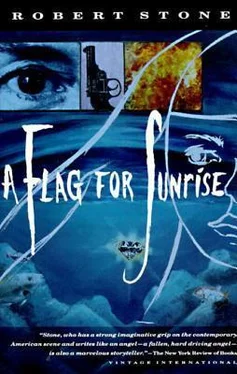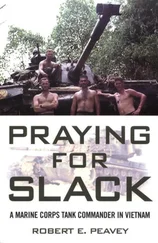Robert Stone - A Flag for Sunrise
Здесь есть возможность читать онлайн «Robert Stone - A Flag for Sunrise» весь текст электронной книги совершенно бесплатно (целиком полную версию без сокращений). В некоторых случаях можно слушать аудио, скачать через торрент в формате fb2 и присутствует краткое содержание. Год выпуска: 2012, Издательство: Vintage, Жанр: Современная проза, на английском языке. Описание произведения, (предисловие) а так же отзывы посетителей доступны на портале библиотеки ЛибКат.
- Название:A Flag for Sunrise
- Автор:
- Издательство:Vintage
- Жанр:
- Год:2012
- ISBN:нет данных
- Рейтинг книги:4 / 5. Голосов: 1
-
Избранное:Добавить в избранное
- Отзывы:
-
Ваша оценка:
- 80
- 1
- 2
- 3
- 4
- 5
A Flag for Sunrise: краткое содержание, описание и аннотация
Предлагаем к чтению аннотацию, описание, краткое содержание или предисловие (зависит от того, что написал сам автор книги «A Flag for Sunrise»). Если вы не нашли необходимую информацию о книге — напишите в комментариях, мы постараемся отыскать её.
A Flag for Sunrise — читать онлайн бесплатно полную книгу (весь текст) целиком
Ниже представлен текст книги, разбитый по страницам. Система сохранения места последней прочитанной страницы, позволяет с удобством читать онлайн бесплатно книгу «A Flag for Sunrise», без необходимости каждый раз заново искать на чём Вы остановились. Поставьте закладку, и сможете в любой момент перейти на страницу, на которой закончили чтение.
Интервал:
Закладка:
His confidence rose and fell irrationally. He became drunker. Shortly before ten he made contact with Aerochac — there was nothing. Standbys? Standbys were being turned away.
If at sunrise, he thought, he had summoned the presence of mind to go straight to the airport he could probably have bought someone’s seat from under them. It was too late for that now. Grimly, he made a reservation for the following day.
It was not going to be a pleasant twenty-four hours. There would be more calls. He would be confined to the hotel, messengers of death would pursue him through its grounds. Oscar would importune him.
Soothed by the whiskey, he thought further of the ride to Tecan. He put the card with Tom Zecca’s number on it beside the phone. It was almost ten-thirty; if he did anything, it must be soon.
He knew shortly that he would go to Tecan. There was every reason for it now. He could not face flying home as he was, to the safety of white winter, terrorized, more crippled than when he had come. He had business down there. On the coast near Puerto Alvarado were things to be seen that it was his business to see, his secret business, the business of his dry spirit. He refused to be frightened away.
Of course, there were the islands just offshore, and the ocean. And he had never driven the stretch of Pan-American Highway between Santiago de Compostela and San Ysidro.
Holliwell finished the drink in his glass and went to the telephone. It’s what you want, he told himself. Don’t obsess over it. Do it.
Marie answered. She sounded pleased enough. It would be fine. Finer still since he had only one bag. Plenty of room.
Holliwell hung up, a little stunned at what he had set about. They would call for him at the hotel at twelve-thirty. There was only time to pack, check out — and go.
When the Zeccas’ car pulled up, he was on the street side of the hotel wall having his shoes shined by a feral twelve-year-old. He leaned against the oily stone, regardless of his best dark shirt, his suitcase behind the heel of his disengaged foot, a Saigon reflex, a half measure against snatchers. The boy was whispering to himself, working over Holliwell’s second shoe with elaborate snaps and flourishes of his cloth.
The Zeccas waved and smiled and left their engine running. There was a balding young man in the back seat. His expression was amiable.
After an unconscionable amount of time the boy proffered up to Holliwell his shined shoes with a deferential smile.
There were sores on the boy’s gums.
Holliwell felt around in his pocket and came up with what proved to his embarrassment to be a U.S. dollar. He handed it over. The shoeshine boy took the dollar and looked quickly up and down the street. His sunken little chest expanded in triumph; he gave Holliwell a smirk of contempt, picked up his box and fled. Two older city Indian boys were advancing on him along the tree-lined avenue, racing barefoot under the palms of the traffic island to cut off his retreat. One of them held a screw-driver handle up in his fist. The blade would be sharpened to a cutting point.
“What did you give him?” the amiable-looking young man in the back seat asked Holliwell, as he climbed in the car with his suitcase. “What’d you give him — a buck?”
“It was all I had,” Holliwell said. “Forgot to get change.”
“Good for him,” Marie Zecca said. “He had a good spot there.”
Tom was watching the pursuit in his rearview mirror. Clutching his box, the smaller boy had turned the corner but the other two were gaining fast.
“Good for him if he gets to keep it.”
They drove toward the Old City, where the Avenida Central broke up its act, rounding the seventeenth-century cathedral and dissipating, delta-like, into the back streets of the market. Indians in straw sombreros with marital knots in the band carried loads of cured hide, squat women in white carried fresh-killed turkeys or stacks of cheap hammocks to sell in front of hotels like the Panamerican. With the hand of experience, Tom Zecca guided his gold-colored Honda through the crowds, past the Salvadorean chorizo stands and the shops selling tail pipes and stolen hubcaps and dried beans.
“Kind of reminds you of market day in Danang,” he said.
The blond young man in the back seat beside Holliwell was named Bob Cole; he sat rigid, staring out at the market streets. He was pale and overweight in an unwholesome way; his teeth were crooked and yellow from smoking. Holliwell sensed a peculiar tension in his frame; Cole held his hands clutched against his knees and the khaki cloth around his grip was moist. He seemed somehow atremble. At first, Holliwell thought he had been drinking.
“It’s all the way,” Cole said.
“What do you mean?” Tom Zecca asked him. “You mean it’s all like Danang? You mean after you’ve seen one marketplace you’ve seen them all?”
Cole never looked at him.
“He means the Third World,” Marie said. “The pre-industrial world, right, Bob?”
“Yes,” Cole said.
“When you get too far from Madison, Wisconsin, it gets unsanitary,” Tom Zecca said. “The people get funny-looking and it’s hot.”
“Tom,” Marie said, “stop teasing.”
They passed the reeking meat markets, the third-class bus station with its cluster of dormitory hotels, and followed the rutted streets to an intersection where the road to the banana lands commenced — the back way out of town, through the side which Santiago de Compostela presented to most of its countrymen and subjects. Within a mile or so of the last cluster of hovels the plantations began.
“My grandfather,” Tom Zecca told them, “always said to me — kid, you don’t know how lucky you are you live in America. Back there it’s all shit. You take your hat off and you eat dirt. Here you got it made.”
“He must have been successful,” Cole said.
“He burned his bridges and he was tough. He lived to see his son be Man of the Year. That was in Toledo, see. They have a Man of the Year every year and my old man was Man of the Year twice. He had a real camel’s-hair coat and my grandfather would come up to him when he put it on and rub his fingers on the cuff and shake his head.’ ”
“America,” Marie said, “success — the whole bit. My family was a little like that. Only we didn’t have any Men of the Year in mine.”
“Have you ever gone to Italy?” Holliwell asked.
“Oh sure,” Tom said. “The Bridge of Sighs. Florence. Verona. Marie and I once spent two weeks in Taormina. Well, the old man flipped. Sicily? What the hell you want to go to Sicily for? It’s all strunz there.”
“That means it’s all shit,” Marie explained.
“I suppose I understand how he felt,” Bob Cole said.
“Eh,” Zecca said, in a tone of mock menace. “Watch it.”
After about an hour of the banana trees, they came to a town called La Entrada. There were railroad yards there and the stacks of an industrial complex. The town had a great many shops and a bank with bright wide windows through which one could see decorative plants and fluorescent lights. There were neat stucco houses with chain link fences in front of them; the square had a new church of triangular concrete slats in the North American suburban style and a playing field with basketball courts.
“They got themselves a steel-rolling mill in this town,” Zecca said. “Old Compostela — little by little — it’s coming up in the world.”
“And Tecan,” Marie said, “little by little it’s going down. Or under. This year there’s a banana disease and a coffee disease. They get the worst of the quakes.”
“When new diseases are invented, Tecan gets them first,” Tom said. “And of course they hold fast to the old ones.”
Читать дальшеИнтервал:
Закладка:
Похожие книги на «A Flag for Sunrise»
Представляем Вашему вниманию похожие книги на «A Flag for Sunrise» списком для выбора. Мы отобрали схожую по названию и смыслу литературу в надежде предоставить читателям больше вариантов отыскать новые, интересные, ещё непрочитанные произведения.
Обсуждение, отзывы о книге «A Flag for Sunrise» и просто собственные мнения читателей. Оставьте ваши комментарии, напишите, что Вы думаете о произведении, его смысле или главных героях. Укажите что конкретно понравилось, а что нет, и почему Вы так считаете.












